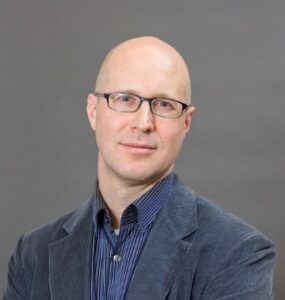Go offline with the Player FM app!
Dan Trudeau, Macalester College – Building Inclusive City Parks
Manage episode 433062728 series 2459839
 Parks are for everyone, right?
Parks are for everyone, right?
Daniel Trudeau, professor of geography at Macalester College, says not everyone may feel welcome.
Dan Trudeau is an urban geographer. He examines the roles of city planning and public policy in shaping urban development. His work explores the interactions between the built environment and social inequality and focuses on efforts to create more just, equitable, and inclusive cities. Dan works and writes in both academic and public-facing venues. He regularly participates in community-engaged research and connects this to courses he teaches at Macalester College.
You can learn more about Dan Trudeau’s research on the website, A Field Guide to Public Spaces, https://publicspaces.guide
Building Inclusive City Parks
https://academicminute.org/wp-content/uploads/2024/08/08-08-24-Macalester-Building-Inclusive-City-Parks.mp3Parks are like a city’s living room. They are supposed to be for everyone. Yet, not everybody feels welcome in these public places, especially among immigrants, people of color, and people with disabilities.
As an urban geographer, my research examines people’s barriers to using and enjoying parks. The goal is to empower city residents and park managers to find solutions to these problems.
My collaborators and I collect information to understand better how visitors experience parks. We use various techniques, from conventional questionnaires to a more creative approach that has people give a tour of the park to show what brings them joy and frustration. We also use anonymized data from mobile phones and the census to place these specific stories in a broader context.
Our research focuses on one park in Saint Paul, Minnesota. Lake Phalen Regional Park is among the most visited parks in the region and draws people from a mix of age, race, ethnicity, and income groups. It’s a model for understanding how parks can operate to welcome and include diverse communities.
This research reveals how people’s perceptions about a place can influence their experience. For instance, seeing diverse communities in the park helps people of color feel safe and welcome.
People from underrepresented groups say that encountering programs organized for people in their communities, like a fishing club for youth, helps them feel included and encourages them to return.
Our research shows that other amenities like clean restroom facilities, signage in multiple languages, and wider paths also make a difference.
These findings reinforce the idea that investing public resources to make parks attractive to different groups – and inviting for everyone – is a sure way to boost inclusion. And when more people use more public parks, the entire community benefits.
The post Dan Trudeau, Macalester College – Building Inclusive City Parks appeared first on The Academic Minute.
288 episodes
Manage episode 433062728 series 2459839
 Parks are for everyone, right?
Parks are for everyone, right?
Daniel Trudeau, professor of geography at Macalester College, says not everyone may feel welcome.
Dan Trudeau is an urban geographer. He examines the roles of city planning and public policy in shaping urban development. His work explores the interactions between the built environment and social inequality and focuses on efforts to create more just, equitable, and inclusive cities. Dan works and writes in both academic and public-facing venues. He regularly participates in community-engaged research and connects this to courses he teaches at Macalester College.
You can learn more about Dan Trudeau’s research on the website, A Field Guide to Public Spaces, https://publicspaces.guide
Building Inclusive City Parks
https://academicminute.org/wp-content/uploads/2024/08/08-08-24-Macalester-Building-Inclusive-City-Parks.mp3Parks are like a city’s living room. They are supposed to be for everyone. Yet, not everybody feels welcome in these public places, especially among immigrants, people of color, and people with disabilities.
As an urban geographer, my research examines people’s barriers to using and enjoying parks. The goal is to empower city residents and park managers to find solutions to these problems.
My collaborators and I collect information to understand better how visitors experience parks. We use various techniques, from conventional questionnaires to a more creative approach that has people give a tour of the park to show what brings them joy and frustration. We also use anonymized data from mobile phones and the census to place these specific stories in a broader context.
Our research focuses on one park in Saint Paul, Minnesota. Lake Phalen Regional Park is among the most visited parks in the region and draws people from a mix of age, race, ethnicity, and income groups. It’s a model for understanding how parks can operate to welcome and include diverse communities.
This research reveals how people’s perceptions about a place can influence their experience. For instance, seeing diverse communities in the park helps people of color feel safe and welcome.
People from underrepresented groups say that encountering programs organized for people in their communities, like a fishing club for youth, helps them feel included and encourages them to return.
Our research shows that other amenities like clean restroom facilities, signage in multiple languages, and wider paths also make a difference.
These findings reinforce the idea that investing public resources to make parks attractive to different groups – and inviting for everyone – is a sure way to boost inclusion. And when more people use more public parks, the entire community benefits.
The post Dan Trudeau, Macalester College – Building Inclusive City Parks appeared first on The Academic Minute.
288 episodes
All episodes
×Welcome to Player FM!
Player FM is scanning the web for high-quality podcasts for you to enjoy right now. It's the best podcast app and works on Android, iPhone, and the web. Signup to sync subscriptions across devices.




